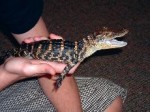Reptile roommate removed

USF may be the home of Bulls, but for three USF students in Cypress Apartments, it’s gator country.
For the last month, USF students A.J. Linden, Spencer Brice and Eric Jonas have kept an unusual pet in their apartment – a foot-and-a-half long, brown-and-black-striped baby alligator named Gary.
“He was a cool little pet,” Jonas said. “Harmless. A good lap pet.”
It might sound funny, but it’s no joking matter to University officials and police. Keeping an alligator as a pet is against University housing policy – which only allows fish – and it violates a Florida statute prohibiting the sale, possession or transportation of alligators or alligator skins. It’s also something that University judicial officials don’t see every day.
“In my 10 years here, that’s the first alligator,” said Tom Kane, director of Residence Services. “We’ve had snakes and hamsters and cats and dogs, but that’s the most exotic.”
On Nov. 6, a University Police officer responded to a complaint that the smell of marijuana was coming from the Cypress B apartment of Jonas and his roommates. During a subsequent room search, the officer discovered misdemeanor amounts of marijuana and drug paraphernalia. He also found Gary. He was under Jonas’ bed in a makeshift habitat composed of wood, mesh netting and a large plastic container full of water.
“We tried to make him feel at home,” Jonas said.
UP contacted the Florida Fish and Wildlife Commission, which sent a trapper to remove the animal, said UP spokesman Sgt. Mike Klingebiel. Jonas said he and his roommates don’t have any idea what was done with Gary after his removal.
“We have absolutely no idea what they did with him,” Jonas said. “But we’re hoping he finds his way back here.”
Officials from the Florida Fish and Wildlife Commission could not be reached for comment about what was done with the alligator.
Jonas, Brice and Linden were charged with misdemeanor possession of marijuana. Additionally, Jonas was also charged with unlawful possession of an alligator. Their cases have been referred to student judicial affairs.
Jonas said he and his roommates found Gary on the side of a road in Sarasota about a month ago, looking like he was in need of some help.
“He was just along the side of the road, not really moving and not really going anywhere,” Jonas said. “We decided to try and take him back with us and see what we could do.”
Jonas and his roommates built Gary a home – a 3-foot by 4-foot wooden box they filled with dirt, leaves, twigs and a large plastic container full of water. They also fed him baitfish every three days and regularly cleaned his accommodations. Soon, Jonas said, Gary regained his strength and was a welcome addition to the roommates’ lives.
“We looked online and read that gators didn’t make good lap pets,” said Jonas. “So we decided to make Gary the perfect lap pet.”
Gary rarely tried to bite, Linden said, and when he did it was harmless. Once Gary grew large enough to be dangerous, Jonas and his roommates planned to give him to Busch Gardens or a local zoo.
Calls to remove pet alligators are not common, said Chad Allison, a nuisance wildlife biologist for the Florida Fish and Wildlife Commission who also said that black spiny-tailed iguanas and Nile monitor lizards are some exotic pet reptiles he receives calls about.
“Most people are too afraid to keep a gator as a pet,” said Allison.
Jason Spratt, associate dean of Student Judicial Services, could not comment on how the cases of Jonas and his roommates would be handled, but did say that Judicial Services would meet with the roommates before deciding on a course of action, in keeping with standard University policy. Spratt added that he couldn’t recall ever receiving a referral for possession of a pet alligator during his time as an administrator.
“It was definitely an unusual referral,” said Spratt.
Jonas said that he isn’t entertaining any thoughts of keeping a pet alligator again.
“I probably won’t be doing that again,” Jonas said. “But if Gary came back, I’d welcome him with open arms.”





